Voyages in Medieval and Renaissance Music
We’re a flexible and versatile group with a large and varied repertoire. Our Vision is to design each programme as a journey and weave our narratives into atmospheric performances.
We’re happy to perform at diverse venues and events — you might find us at concerts, fairs, professional meetings, art shows, museums, holy observances, and on beyond!
We usually work as an ensemble of four or five. Read about our unusual name and instruments below.
- Website re-organisation!
- Live video recording project: see HERE
- Travelling towards two new programmes: Ars Moriendi/Danse Macabre and Advent
- See our programmes and book us
- Link to performance history coming
- Visit our YouTube channel and Facebook page.
- Read on to find out more!
True to our name, which has rich layers of meaning related to travel and navigation, we roam the centuries in Europe, with occasional forays over the seas. As we venture along, we bring what instruments we can carry: primarily voices and viols, and sometimes vielles, recorders, drums, or other early instruments.
Like the tramontana wind, our music crosses borders, stirring emotions and connecting cultures
We believe in taking a historically informed approach to the music, but also value exploring the full potential of our instruments. You might hear us juxtaposing music and instruments from different times and places. We experiment with blending timbres for a soundworld that evokes the spirit of the times.
In fact, medieval and Renaissance times, for all their differences, encompass a strong continuity of ideas as well. In our journeys, we not only move across countries and eras but we explore the connections between them. Our interest in these division-crossing connections came before and yet resonates with the most recent turmoil over immigration and other struggles of separateness and belonging.
Please scroll down or click for more about our name and the ways we connect with the past!
Ensemble Tramontana is:
Left to right
Esha Neogy, viols
Timea Gazdag, voice
Eszter Komáromi, viols/vielle
Amanda Seaborn, viols
. . . and other regulars and guests!
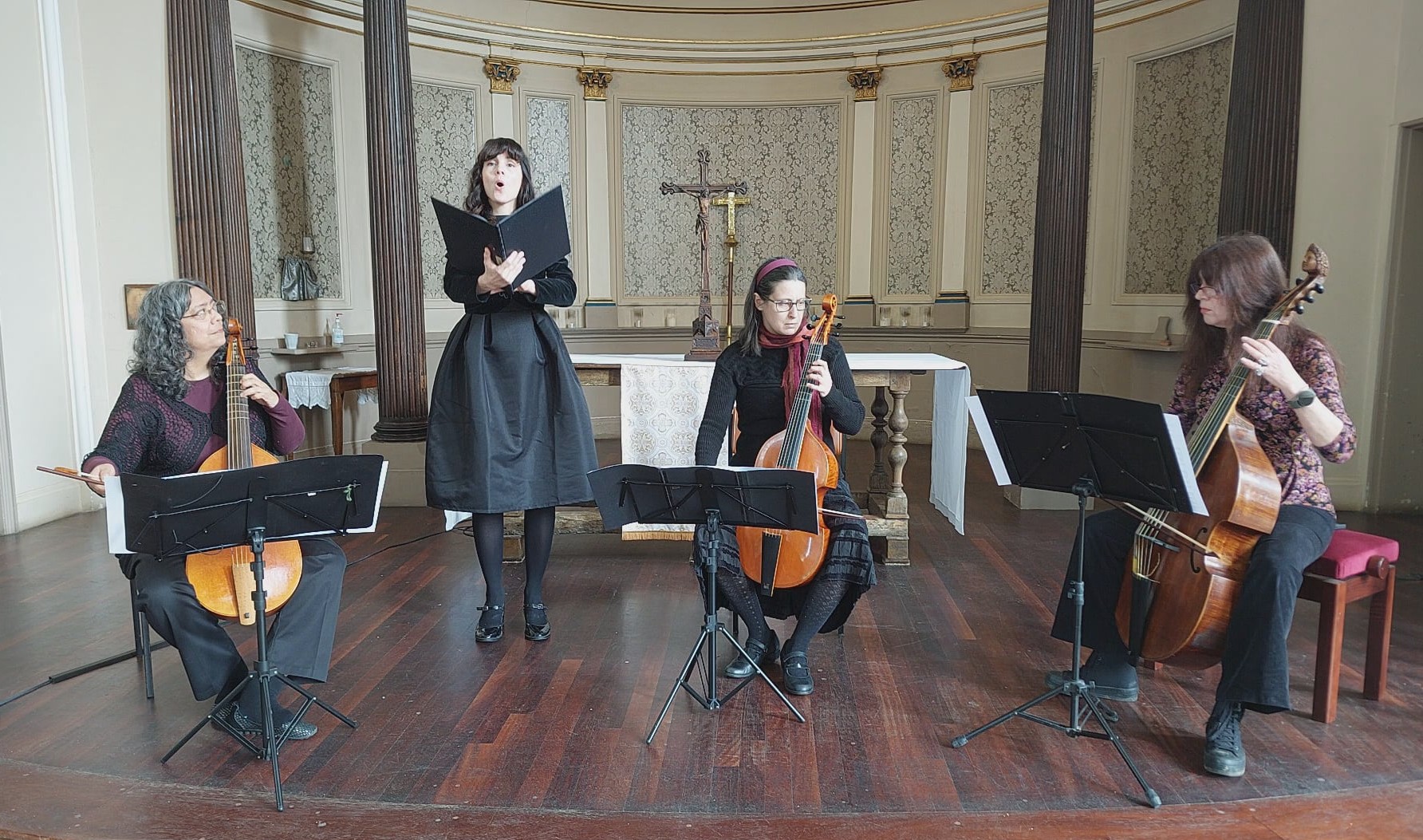
‘Wonderful ensemble playing and great
programme planning.’
~ Early Music Today
Tramontana and Its Era
Tramontana* is the name of a northern wind that sweeps and swirls across Europe, through the French and Spanish Pyrenees and the Italian Alps and along the coast, before reaching the Mediterranean Sea. According to local legends, the howling wind, bitterly cold, dry and relentless, has the power to induce madness. The word itself means ‘across the mountains’ and was used to refer to the northern direction, but also to anything or anyone strange or foreign. From as early as the late 13th century, it was also an alternative name for the North Star or Pole Star, a pivotal navigation aid of the times and sometimes a Christian metaphor for Mary or for Christ himself. Our programmes reflect our name in that we design each one as a metaphorical journey and also tend to refer to stars/mountains/waters and winds along the way.
^ also tramontane, tramuntana, and other variations in different Mediterranean languages
Medieval and Renaissance times may have been very different from each other in artistic styles and worldview, but the periods as a whole were an extended time of revival, discovery, and growth. It was the era of courtly love, the Crusades, trade routes and of course Columbus’s epic voyage of 1492. It was a time of exploration, of fundamental social change, of revival of ancient knowledge coupled with discovery of new lands and wonders — and of much beautiful art and music. We relish connecting seemingly unrelated elements within the historical and social context of the music, then building on them to create a sense of the people of this overall time and place.
What We Do
Our programmes generally create a journey or tell a story – and after all, a story is also a journey. We combine music of different eras by themes more than chronologically, and often include references to stars/winds/mountains, or navigate voyages through history/geography/emotions. We are based in London but travel widely, and we have performed or will be performing in an extensive variety of situations including the following:
- Major concert venues such as St Martin-in-the-Fields and Kings Place
- Churches, historic buildings, and museums such as the National Maritime Museum, Handel House (now called Handel and Hendrix in London), and the Geffrye Museum
- Mental health activity days at MIND and The Dragon Café
- Celebrations of Shakespeare and other authors, anniversaries of historical events, other theatrical productions
- Cafés, dinner meetings, and outdoor festivals such as Crystal Palace Overground Festival and Lewisham People’s Day
- Educational or fundraising events, church services, society or special-interest club meetings, private house concerts
Please see our Book Us page for a sampling of programmes we perform.
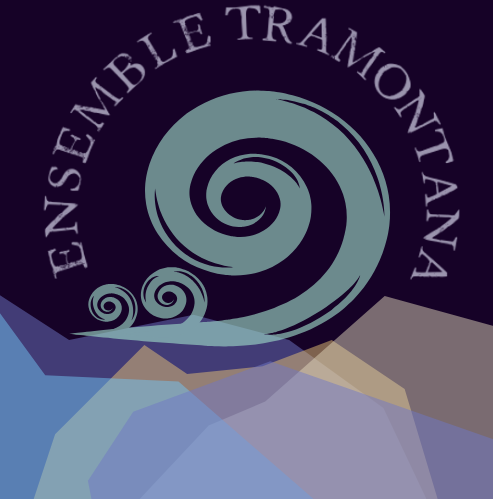
founded 2010
‘You’re a crossover band!’
~ Belinda Sykes
Performer of medieval, traditional, and international music; improviser, storyteller, teacher; and much more
Performers
Core Members

Esha Neogy
General manager, viol, Founding member
Esha Neogy is a viola da gamba (viol) player, event organiser, and editor who lives in London and makes semi-regular visits to her hometown of Honolulu. In addition to Ensemble Tramontana, the groups and individuals she has performed with include Musica Antica Rotherhithe, Musicke in the Ayre, Lutesinger (Helen Atkinson), Chelys Consort of Viols, Plumstead Chamber Choir, the Hawai‘i-based group Europa Early Music Consort, and various other ensembles and theatre groups. The first syllable of Esha’s name is pronounced like saying the English name of the letter A, to rhyme with ‘may’.
The events Esha has directed or organised include the international Pan-Pacific Gamba Gathering (PPGG), held in Honolulu, and the Biennial Conference on Literature and Hawai’i’s Children, held in Honolulu and online. She occasionally hosts relaxed ‘discomfort zone’ viol sessions at her house for competent musicians who would like to get out of their ‘comfort zone’ by learning a new instrument socially along with their peers.
Most recently, Esha is learning the vielle/medieval fiddle and the lira da braccio, with her eye on the lirone. She hopes to get back to her creative writing practice and has returned to weaving and other textile crafts – yet another use for strings!
For more details, please see the founding members list below.
Back to: TOP or CORE MEMBERS

Eszter Komáromi
Founder, main programme designer, video design, audio and video editing, viol, vielle/medieval fiddle
Eszter Komáromi (founder) grew up in Hungary, where she studied biology and computer programming and worked as a software developer. Her passion, however, has always been for music. She started the cello at the age of seven and played in various orchestras and chamber music formations until she started learning the viol in 2004, taking private lessons from Sándor Szászvárosi. She attended courses in Hungary (Bukk Summer Academy) and abroad.
Eszter obtained her LTCL diploma in 2010 and did postgraduate study in viola da gamba at Trinity Laban Conservatoire of Music and Dance, studying with Alison Crum and supported by the Ferrabosco Scholarship. She was an active member of Trinity Laban’s early music ensembles and worked on projects there including the creation of Ensemble Tramontana and collaborations with the departments of Composition and Jazz.
Her projects then and since include solo recitals; a study on playing outdoors and in other non-traditional venues; and the designing of programmes for both Ensemble Tramontana and her own Inspired Melancholy project. Eszter has performed with various groups and individuals such as the Lovekyn consort, the Exmoor Singers of London, and Philip Thorby.
Back to: TOP or CORE MEMBERS

Timea Gazdag
soprano
About Timea
Back to: TOP or CORE MEMBERS
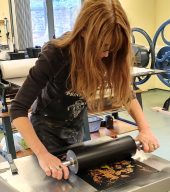
Amanda Seab0rn
viol, recorder
Amanda's art
Back to: TOP or CORE MEMBERS
Recurring Performers

Paul Alexei Smith
countertenor, translations
Kate Conway, viol
About Kate
Oliver Doyle, tenor
Musica Antica Rotherhithe links:
Website | Facebook
Louise Eekelaar, soprano
Website
Allan Fagerlund, viol, vielle/medieval fiddle, symfonie
Occasional Performers
Emily Baines, recorder and voice
EmilyBaines.co.uk | Facebook
Jennifer Barron, viol
JenniferBarron.com
Sophia Brumfitt, mezzo-soprano
Website | Facebook
Kieran Cooper, bass-baritone
Julie Dean, recorder and percussion
Recorder Shop London and Peterborough
Henry Drummond, viol
About Henry | More About Henry
~~~
With Greenwich Consort friends
Viols for St Michael’s Camden services/concert 2019:
Catherine Clark
Dorothy Goodall
Maureen Jackson
Caroline Wood
– led by Tramontana member Esha Neogy
Chris Lamb. viol
About Chris
Jim Lindsay, audio editing, percussion
Richard MacKenzie, lute
About Richard and some of his CDs
Michael Mullen, viol, Renaissance flutes, cornetto
Marion Pilbeam, viol
Ruth Ridley, viol
Srabani Sen, actor
LinkedIn | Twitter
~~~
With Greenwich Consort friends
Instruments for The Bard at St Barnabas 2019:
Simon Galton, recorder
Kate Jackson, recorder and percussion
Cathie Tedder, viol
– led by Tramontana member Julie Dean
Want to perform with us or collaborate?
Please read our participation guidelines and get in touch
Other Support
Karen Lunde
website setup
Chanterelle Marketing Studio
The Olympia Peace Choir
Karen’s photos
Jim Lindsay
audio editing, percussion
Ted Copper
recording, instrument loan, photography
John Merron
ideas, transport, recording
Din Ghani
recording, scores
Musicke in the Ayre links: Facebook | YouTube
Sean Keeves, professional live recording 2019
Pasu Recordings
Robin Adams
ideas, printing
Dava Suren
recording, photography
Catherine Clark
rehearsal stand-in, venue preparation, hospitality
Catherine’s art
Simon Peterken
house concert venue
Caroline Wood
instrument loan, rehearsal stand-in
Gabby Bignell
instrument loan
Gabby’s art | Gabby’s massage therapy
Gabrielle Bignell: massage therapist on LinkedIn
David Fireman
sweets design
Mr Humbug shop
Rehearsal stand-ins
Catherine Clark
Andrew Freeland
Michael Jenner
Marion Pilbeam
Shirley Vaughan
Caroline Wood
Early Years
Ensemble Tramontana was:
Left to right
Eszter Komáromi, viols/vielle
Esha Neogy, viols
Rie Kosaka, voice/harps
Louise Eekelaar, voice
Julie Dean, recorders/percussion
Profiles below
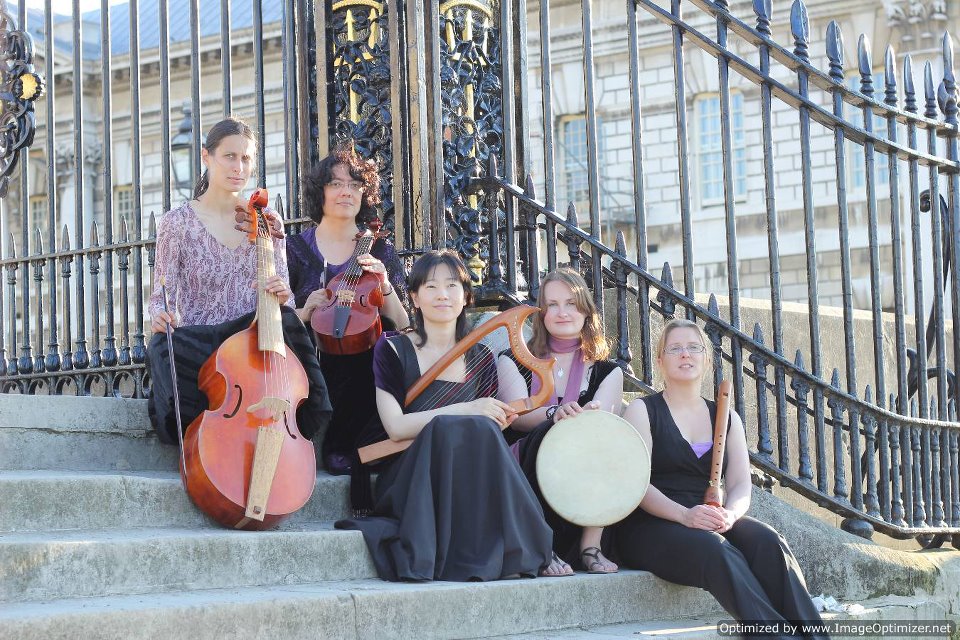
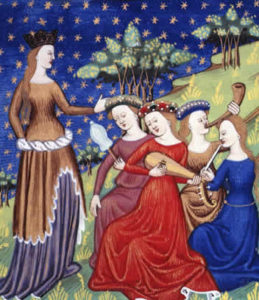
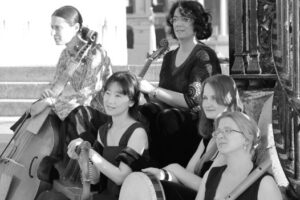
Beginnings
From the beginning, it has been natural for us to look for cross-border connections within the historical and social contexts of the two linked eras we explore. Most of our composers, some of the characters in our songs, and all of our performers have travelled. The founding members of our ensemble each came from elsewhere (some from other countries) to study at Trinity Laban Conservatoire of Music and Dance in London.
In the Early Music Department there, we benefitted from the instruction of specialists including Belinda Sykes, Alison Crum, Philip Thorby, and Timothy Travers-Brown. On 23 March 2011, we won the conservatoire’s Early Music Competition, which launched us with great momentum on our journey as professionals. Again like the tramontana wind, our music settles nowhere, but continually sweeps across mountains, borders, and other obstacles.
Founding Members

Esha Neogy
Viols

Eszter Komáromi
Founder, main programme designer, viols, vielle/medieval fiddle

Louise Eekelaar
VOICE
Twice winner of the Trinity Laban Conservatoire of Music and Dance Early Music Competition in 2011 and 2013 with Ensemble Tramontana and Virtuosa, Louise is a professional singer based in London, specialising in early music and with extensive experience in all forms of solo and choral styles, from medieval to contemporary. She is also Director of Music at Holy Trinity Church in Brook Green, London.
Louise studied with Alison Wells and Timothy Travers-Brown at the Trinity Laban Conservatoire of Music and Dance, where she obtained her LTCL Diploma with distinction, and holds a Masters in Early Music from the University of York.

Julie Dean
RECORDERS, PERCUSSION
Julie Dean gained her BMus degree in 1998 at Goldsmith College, London. In 2006, after a successful management career in retail and the licensed trade, she returned to music, attending Trinity College of Music for her MMus studying the recorder with Rebecca Miles and viola da gamba with Alison Crum.
Visit Julie’s websites: Recorder Groups London and Recorder Shop London

Rie Kosaka
VOICE, Harps
Rie enjoys both singing and playing the harp and has a passion for medieval and Renaissance music. She studied at Trinity Laban Conservatoire of Music and Dance and earned her MMus degree from the Guildhall School of Music and Drama. She now resides in Japan with her husband, son, and harp-playing cat; she continues to perform and teach.
Tramontana website setup: Originally Rie using Yolasite, then Karen Lunde using WordPress/Elementor as Circle Round Creative. Karen Lunde is now Chanterelle Marketing Studio.
Founders’ reunion concert 2019

Rie edited herself in from Japan!
